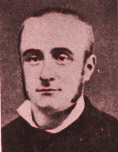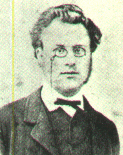Did I not have once upon a time a delightful
childhood, heroic, fabulous, to be written on sheets of gold - too lucky! Through what
crime, through what error, have I deserved my present weakness? You who say that animals
sob from grief, that the sick despair, that the dead have bad dreams, try to relate my
fall and my sleep. I can explain myself no better that the vagrant with his incessant
Pater and Ave Maria. I do not know how to speak! -Arthur Rimbaud
|
In the
beginning, there was Frederic Rimbaud and Vitalie Cuif.
Frederic Rimbaud was Captain of Infantry and the author of several unpublished military
works. At one time, he also painstakingly translated The Koran into French (his
youngest son, Arthur, would later use this document to learn Arabic.) Frederic
was said to have had an easy-going, good natured way about him. A lover of travel and good
times, according to Enid Starkie’s incomparable biography ARTHUR RIMBAUD - A
BIOGRAPHY.
Marie Catherine Felicite Vitalie Cuif, however, was a different entity altogether. She was
raised by her father (known as “Old Cuif”), a farmer, and two unruly brothers.
Many say that Arthur Rimbaud’s own unruly nature was in his blood, passed down from
his uncles, particularly Vitalie’s brother Charles-Auguste Cuif.
Apparently, Vitalie was in charge of running the family’s farm, and was quite strict
on her two brothers, particulary Charles, who was five years her junior. As the story
goes, Vitalie’s constant badgering and cruel judgements led Charles to leave home and
marry at the young age of twenty-two.
(above L-R :
sister Isabelle; a young Rimbaud; sister Vitalie)
However, his plan to “escape” Vitalie was
slightly foiled, since she soon met Frederic and married in February of 1853. Charles,
therefore, was put in charge of the farm, and, as Starkie puts it, was “a lazy
spendthrift, (a) drunkard.” Soon enough, he spent the money alloted to run the farm,
and let the entire place go to shambles. It was not long before the family business went
bankrupt. Allegedly, Charles would stop by his sister and brother-in-law’s home,
begging for money or a cot on which to sleep. Vitalie would give him small bits of money
with the promise he would stay clear of her home, since she was embarrassed by her
brother’s “bad ways”. Charles ended up living the longest of all the Cuif
children - 94 years. On his deathbed, he refused a priest and last sacraments, opting for
a litre of red wine instead.
Vitalie’s other brother, Jean-Charles-Felix-Cuif proved to be a bit on the eccentric
side as well. He was nicknamed “The African” because of his Algerian adventures.
He ran away from home at 17 years of age, and only returned just after Frederic and
Vitalie married. Felix died the following year.
Arthur Rimbaud and his uncles seemed to share much more in common than Arthur ever found
in either of his parents. Adventure, revolution and excess appear to almost have been
hereditary traits, passed on by “mad” uncles.
Naturally, the differences between
Vitalie and Frederic proved destructive. Says Starkie: “(Vitalie) was stingy in the
money affairs, where he was lavish, bigoted in her religious views where he was
free-thinking, rigid in her morality, whereas he was somewhat lax, and, moreover, was
completely lacking in a sense of humor. It is said she treated him with the same severity
which she meeted out to her children, that she tried to eradicate what she considered
failings in him and to counteract his levity.”
During their brief marriage, the Rimbauds bore five children. The first was
Jean-Nicholas-Frederick, born in February 1953. The second was Jean-Nicholas-Arthur
Rimbaud, born on 20 October 1854, followed by a first daughter, who died in infancy. There
were two more sisters to follow: Vitalie and Isabelle, respectively.
Paterne Berrichon had an interesting anecdote about Arthur’s birth. Supposedly, a
nurse had just washed the newborn and set about to fetch a cloth from another room. When
she returned, she found the child on the ground, crawling towards the door. Somehow the
child had gotten out of his crib and began wandering, then and there, just a few hours
old! But, as Starkie notes, this may just be a story fabricated by Arthur in later years,
baring a striking resemblance to the Merlin legend. Perhaps, though, given the history of
his life, this piece of the puzzle fits quite snugly.
In 1858, Vitalie’s father passed on. This, too, was the year that Captain Rimbaud
left his wife and children, never to return again.
The family then picked up and moved from Rue Napoleon to the nearby Rue Bourbon, a
low-income rather “slummy” area. Vitalie kept a very tight household, not
allowing anyone in, and rarely anyone out. She was rude and disdainful towards the
neighbors because of their “lower” place on the hierchal ladder. But, somehow,
young Arthur Rimbaud managed to sneak past his mother from time to time, playing and
adventuring with his “poor, lowly” neighbors.
Vitalie responds to this by moving the family to a lovely, more upscale area, Cors
d’Orleans. It is here that both boys were to attend Pension Rossat, studying Latin
and Greek. While at Rossat, Rimbaud composed his first piece: a 700-word compostion which
earned him praise both in the classroom and within his home. Vitalie set about to make
this budding prodigy a trophy of sorts, giving up altogether on Arthur’s slower
brother. She would send Arthur to bed supperless when he incorrectly recited the large
collections of Latin verse she forced him to memorize.

Childhood friend,
DELEHAYE
Naturally, Arthur began to resent his mother for
this, and yet, each Sunday he would march single file with his siblings to church,
following the strict Vitalie, clad in her constant black wardrobe.
Arthur kept himself occupied by reading incessantly; in particular, he fancied fairy tales
and adventure novels by authors like Fenimore Cooper and Gustave Aimard. At this time, he
also began developing a deep-rooted obsession with the sea, which would later prove to be
one of his biggest muses.
When Frederick was twelve and Arthur eleven, they were sent to College de Charleville. It
was here that Arthur became absolutely obsessed with religion. He spoke of the guilt he
felt for his sins - this was the beginning stages of a complex that would haunt both his
work and mind until his death.
He excelled in school, and was given private lessons from his form master, M. Lheritier,
who taught him Greek and Latin, as well as French literature. Arthur finished his third
year with great success.

George Izambard,
Rimbaud's professor
It was then that the Rimbauds moved for the last
time, to Quai de la Madeleine (now Quai du Moulinet).
He proved awkward in his early teens, making few friends. He was growing tired of
schooling, of his mother’s tireless pushing, and of life in a small town as well. He
would sneak off with his close friend Delahaye to smoke tobacco and talk of politics,
literature and philosophy. It was at this time that Arthur began writing original verse
for the first time.
At age 13, he sent a poem of 60 Latin hexamters to the Prince Imperial on 8 May 1868 and
was publicly thanked. Teachers began regarding him as a prodigy, and he won several
awards, becoming a bit of a scholarly legend in his school. At age 15, his first poem was
published in La Revue pour Tous. It was called Les Etrennes de Orphelins (The
Orphans’ New Years Gift).
Childhood friend,
Enter George Izambard,
the first true influence in young Arthur’s life. He came as a master to the College
de Charleville, and soon the two became more than teacher and pupil. They became
peers.Izambard began lending books to Arthur; books of Parnassian poetry, in particular.
He once lent Arthur a copy of Hugo’s Les Miserables. This resulted in a huge protest
from Mme. Rimbaud, when she found her son reading such "filth".
In a letter to Izambard, Mme. Rimbaud wrote:
Monsieur,
I am extremely grateful to you for all that you are doing for Arthur....But there is one
thing that I cannot approve of and that is, for instance, his reading the book you lent
him the other day (les miserables, V. hugot.) [sic] You must realize, even better than I,
that great care is needed in the choice of books that are put in the hands of children.
And so I am forced to believe that Arthur must have gotten hold of the book without your
knowledge. It would certainly be dangerous to allow him to continue such reading...
V. Rimbaud
Izambard continued giving Rimbaud
“challenging” and “controversial” books anyway, and he was forever
scorned by Vitalie for his “encouragement of revolt”. However, Izambard had
plans of leaving, which crushed the young child. He left Arthur a key to his study,
however, so that he might continue reading from his library.
In a note to Izambard in August of that year, Rimbaud wrote:
P.S. Very soon I shall give you some startling
news of the kind
of life I’m going to lead after the summer holidays.
This short line proved true, though, perhaps not in the way Arthur intended.
A continuation of this biography
is in the works. Please check the site soon.
This biography could
not have been possible without the labor of Enid Starkie, author
of ARTHUR RIMBAUD: A BIOGRAPHY (New Directions) and Oliver Bernard, translator and
essayist for ARTHUR RIMBAUD: COLLECTED POEMS (Penguin). Both of these books are available
for purchase from Amazon.com via the BOOKS link.
|